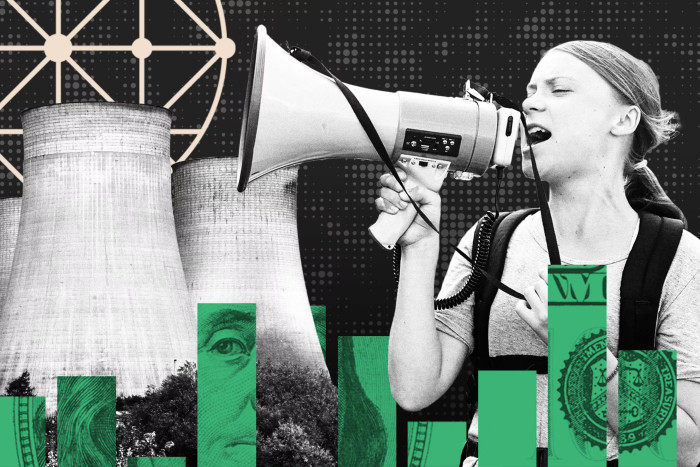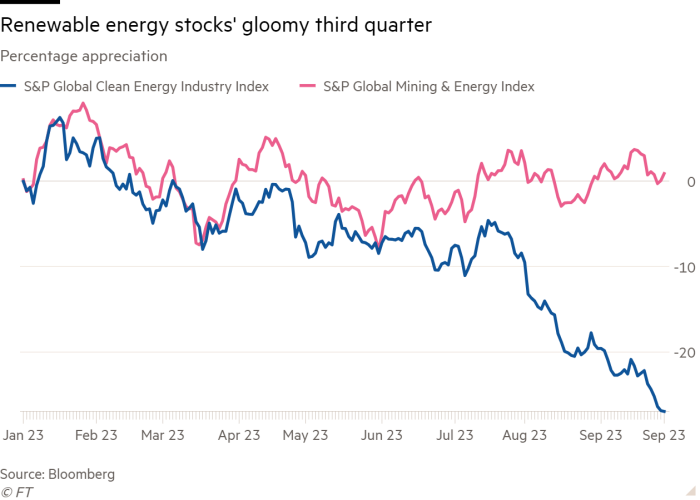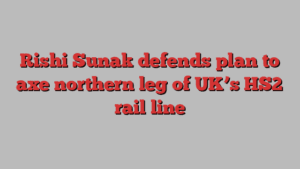
Receive free Global Economy updates
We’ll send you a myFT Daily Digest email rounding up the latest Global Economy news every morning.
This article is an on-site version of our FirstFT newsletter. Sign up to our Asia, Europe/Africa or Americas edition to get it sent straight to your inbox every weekday morning
Good morning.
As we head into the third day of the UK Conservative party’s annual conference, Prime Minister Rishi Sunak has been facing a storm of protest over plans to axe the northern leg of the HS2 high-speed rail line.
Downing Street insisted “no decision has been taken” on HS2 but senior Conservatives said Sunak had decided to save billions of pounds by building only the southern leg between London and Birmingham.
Aides to Jeremy Hunt, the chancellor, did not deny that he had already approved the radical scaling back of the HS2 project. “A decision will be announced in due course,” said one.
Andy Street, the Tory mayor of the West Midlands, accused the prime minister of “cancelling the future” and undermining investor confidence in Britain by aborting the country’s most high-profile infrastructure project.
“If you tell the international investment community you are going to do something you bloody well have to stick to your word,” he said at a meeting on the fringe of the Conservative conference. Here’s what other Tories are saying in a debate that has dominated the conference.
Go deeper: In a sign of a growing rift between Sunak and his party’s right wing, former premier Liz Truss has returned to lead the push for more tax cuts at the conference in Manchester.
Opinion: Politicians should agree with Sunak on multiculturalism and reflect on Britain’s relative success in integrating minorities, but they should do so without illusions, writes Stephen Bush.
UK economy: Retail inflation declined to the lowest level in a year last month as food price growth eased sharply to a single-digit rate, industry data showed.
With the Tory event continuing and Labour holding its own conference from Sunday, Britain has a busy month in politics. For up-to-date analysis, sign up for our Inside Politics newsletter or listen to our weekly podcast, Political Fix.
What do you think of Sunak’s chances of unifying his party before next year’s elections? Let me know at [email protected] — Tee
And here’s what else I’m keeping tabs on today:
Sam Bankman-Fried: Jury selection at a Manhattan federal court kicks off the trial of the FTX founder, who faces criminal charges that carry a combined maximum sentence of more than a century in prison. Here are some of the central figures in crypto’s most high-profile trial.
German Unity Day: Markets are closed in Germany, which marks the reunification of East and West Germany in 1990.
Nobel Prize: Winners are being announced over the week with Katalin Karikó and Drew Weissman receiving the award in medicine yesterday for their work which led to Covid-19 vaccines. The award for physics will be announced today.
Five more top stories
1. Exclusive: The European Commission is preparing to release about €13bn in EU funds to Hungary, frozen since last December because of human rights and rule of law concerns. The move could secure Budapest’s support for an increase to the bloc’s budget as Brussels seeks to ensure continuing financial aid to Ukraine. Read the full story.
Related: The weekend deal to avert a US government shutdown also stripped out any help for Kyiv, revealing just how unpredictable Washington’s backing could be.
The FT View: In what seems set to be a multiyear war of attrition, the west must find ways to speed up support for Ukraine and to lock it in for the future, writes the Financial Times’ editorial board.
2. Exclusive: India has demanded Canada withdraw roughly 40 diplomats by October 10, according to people familiar with the matter, in an escalation of the crisis that erupted when Prime Minister Justin Trudeau said New Delhi may have been linked to the murder of a Canadian Sikh. Demetri Sevastopulo has more details from Ottawa.
Opinion: Despite their courtship of New Delhi, the west cannot turn a blind eye if Canada gives convincing evidence of India’s role in the killing, writes Gideon Rachman.
3. The IMF’s chief has backed reforms that could eventually give Beijing more voting power within the fund and warned of “devastation” if her institution remains without adequate financial resources to aid struggling countries. Kristalina Georgieva told the Financial Times that the IMF should better represent changes in the global economy, implicitly referring to China. Here’s how representation in the fund could change.
4. Microsoft’s CEO has called the idea that users have choice in internet search “bogus” because of contracts that make Google the default search engine on mobile devices. At an antitrust trial pitting Google against the US Department of Justice, Satya Nadella also testified that he had explored whether Apple would switch to an agreement with Microsoft’s search engine Bing. Here’s more from Nadella’s testimony.
More Big Tech: X, formerly known as Twitter, has signed a first-of-its-kind deal with celebrity Paris Hilton centred around live shopping and other exclusive content.
5. US Treasury yields climbed to a 16-year high yesterday after better than expected manufacturing data bolstered investors’ belief that the US economy is in good shape. Bond prices, which move inversely to yields, dropped sharply around the world in recent weeks as investors expected central banks to hold interest rates higher for longer.
The Big Read

ESG ratings influence, and in some cases dictate, which stocks and bonds make it into the $2.8tn of investment funds that are marketed as sustainable, lending legitimacy to companies and investors that claim to be green. Yet that power is now coming under intense formal scrutiny. Regulators and politicians around the world are asking questions about how the ratings are derived — and whose interests they really serve.
We’re also reading . . .
Chart of the day
Renewable energy stocks have sold off sharply in recent months, significantly underperforming fossil fuel companies, as higher interest rates take a toll on the sector. The S&P Global Clean Energy Index, made up of 100 of the biggest such companies, is set for its worst annual performance since 2013.

Take a break from the news
Adventurous tailoring, barely-there dresses and a designer debut — at Paris Fashion Week, brands including Alexander McQueen, Balenciaga and Valentino played to their strengths, writes FT fashion editor Lauren Indvik.

Additional contributions from Benjamin Wilhelm and Gordon Smith
Recommended newsletters for you
Working It — Everything you need to get ahead at work, in your inbox every Wednesday. Sign up here
One Must-Read — The one piece of journalism you should read today. Sign up here

